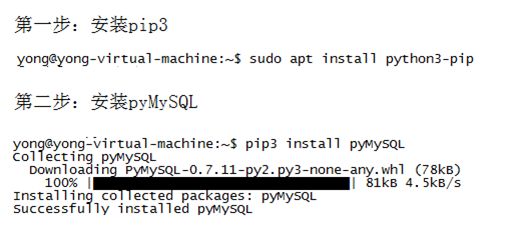1、安装mysql模块
python2 ubuntu16.4环境下安装
先安装依赖,否则安装mysql-python失败
sudo apt-get install libmysqlclient-dev
安装mysql-python
pip install mysql-python
python3 ubuntu16.4环境下安装
安装pip3,pip是python2使用的,pip3是python3使用的
sudo apt install python3-pip
#安装pymysql模块
pip3 install pymysql
安装mysql模块,windows和ubuntu
在文件中引入模块,注意大小写
import pymysql
2、交互类型
Connection对象:用于建立与数据库的连接
创建对象:调用connect()方法
conn=connect(参数列表) #注意参数的名字
参数host:连接的mysql主机,如果本机是'localhost'
参数port:连接的mysql主机的端口,默认是3306
参数db:数据库的名称
参数user:连接的用户名
参数password:连接的密码
参数charset:通信采用的编码方式,默认是'gb2312',
要求与数据库创建时指定的编码一致,否则中文会乱码
对象的方法
close()关闭连接
commit()事务,所以需要提交才会生效
rollback()事务,放弃之前的操作
cursor()返回Cursor对象,用于执行sql语句并获得结果
Cursor对象的方法:
执行sql语句
创建对象:调用Connection对象的cursor()方法
cursor1=conn.cursor()
close()关闭
execute(operation [, parameters ])执行语句,返回受影响的行数
fetchone()执行查询语句时,获取查询结果集的第一个行数据,返回一个元组
fetchall()执行查询时,获取结果集的所有行,一行构成一个元组,再将这些元组装入一个元组返回
scroll(value[,mode])将行指针移动到某个位置
mode表示移动的方式
mode的默认值为relative,表示基于当前行移动到value,value为正则向下移动,value为负则向上移动
mode的值为absolute,表示基于第一条数据的位置,第一条数据的位置为0
对象的属性:
rowcount只读属性,表示最近一次execute()执行后受影响的行数
connection获得当前连接对象
3、增删改
创建testInsert.py文件,向学生表中插入一条数据
import pymysql
try:
conn=pymysql.connect(host='localhost',port=3306,db='test1',user='root',
passwd='123',charset='utf8')
cs1=conn.cursor()
count=cs1.execute("insert into students(sname) values('张良')")
print(count)
conn.commit()
cs1.close()
conn.close()
except Exception,e:
print(e)
创建testUpdate.py文件,修改学生表的一条数据
#encoding=utf-8
import pymysql
try:
conn=pymysql.connect(host='localhost',port=3306,db='test1',user='root',
passwd='123',charset='utf8')
cs1=conn.cursor()
count=cs1.execute("update students set sname='刘邦' where id=6")
print(count)
conn.commit()
cs1.close()
conn.close()
except Exception,e:
print(e)
创建testDelete.py文件,删除学生表的一条数据
#encoding=utf-8
import pymysql
try:
conn=pymysql.connect(host='localhost',port=3306,db='test1',user='root',
passwd='123',charset='utf8')
cs1=conn.cursor()
count=cs1.execute("delete from students where id=6")
print(count)
conn.commit()
cs1.close()
conn.close()
except Exception as e:
print(e)
sql语句参数化:可以防注入
创建testInsertParam.py文件,向学生表中插入一条数据
#encoding=utf-8
import pymysql
try:
conn=pymysql.connect(host='localhost',port=3306,db='test1',user='root',
passwd='123',charset='utf8')
cs1=conn.cursor()
sname=input("请输入学生姓名:")
params=[sname]
count=cs1.execute('insert into students(sname) values(%s)',params)
print(count)
conn.commit()
cs1.close()
conn.close()
except Exception as e:
print(e)
其它语句:
cursor对象的execute()方法,也可以用于执行create table等语句
建议在开发之初,就创建好数据库表结构,不要在这里执行
4、查询
创建testSelectOne.py文件,查询一条学生信息
import Pymysql
try:
conn=Pymysql.connect(host='localhost',port=3306,db='test1',user='root',
passwd='123',charset='utf8')
cur=conn.cursor()
cur.execute('select * from students where id=7')
result=cur.fetchone()
print result
cur.close()
conn.close()
except Exception as e:
print(e)
创建testSelectMany.py文件,查询多条学生信息
#encoding=utf8
import Pymysql
try:
conn=Pymysql.connect(host='localhost',port=3306,db='test1',user='root',
passwd='123',charset='utf8')
cur=conn.cursor()
cur.execute('select * from students')
result=cur.fetchall()
print result
cur.close()
conn.close()
except Exception as e:
print(e)
5、封装
观察前面的文件发现,除了sql语句及参数不同,其它语句都是一样的。
创建MysqlHelper.py文件,定义类:
#encoding=utf8
import pymysql
class MysqlHelper():
def __init__(self,host,port,db,user,passwd,charset='utf8'):
self.host=host
self.port=port
self.db=db
self.user=user
self.passwd=passwd
self.charset=charset
def connect(self):
self.conn=MySQLdb.connect(host=self.host,port=self.port,db=self.db,
user=self.user,passwd=self.passwd,charset=self.charset)
self.cursor=self.conn.cursor()
def close(self):
self.cursor.close()
self.conn.close()
def get_one(self,sql,params=()):
result=None
try:
self.connect()
self.cursor.execute(sql, params)
result = self.cursor.fetchone()
self.close()
except Exception as e:
print(e)
return result
def get_all(self,sql,params=()):
list=()
try:
self.connect()
self.cursor.execute(sql,params)
list=self.cursor.fetchall()
self.close()
except Exception as e:
print(e)
return list
def insert(self,sql,params=()):
return self.__edit(sql,params)
def update(self, sql, params=()):
return self.__edit(sql, params)
def delete(self, sql, params=()):
return self.__edit(sql, params)
def __edit(self,sql,params):
count=0
try:
self.connect()
count=self.cursor.execute(sql,params)
self.conn.commit()
self.close()
except Exception as e:
print(e)
return count
创建testInsertWrap.py文件,使用封装好的帮助类完成插入操作
#encoding=utf8
from MysqlHelper import *
sql='insert into students(sname,gender) values(%s,%s)'
sname=raw_input("请输入用户名:")
gender=raw_input("请输入性别,1为男,0为女")
params=[sname,bool(gender)]
mysqlHelper=MysqlHelper('localhost',3306,'test1','root','mysql')
count=mysqlHelper.insert(sql,params)
if count==1:
print('ok')
else:
print('error')
创建testGetOneWrap.py文件,使用封装好的帮助类完成查询最新一行数据操作
#encoding=utf8
from MysqlHelper import *
sql='select sname,gender from students order by id desc'
helper=MysqlHelper('localhost',3306,'test1','root','mysql')
one=helper.get_one(sql)
print(one)

